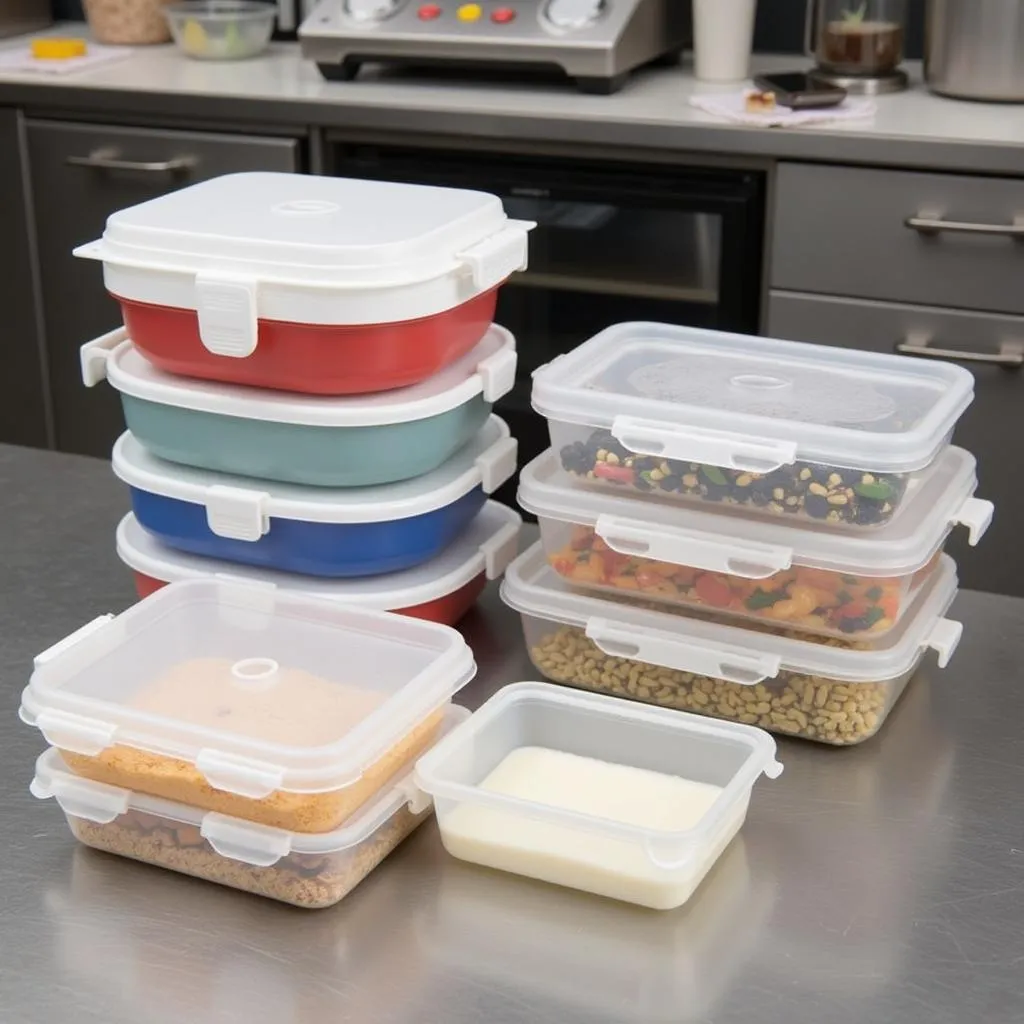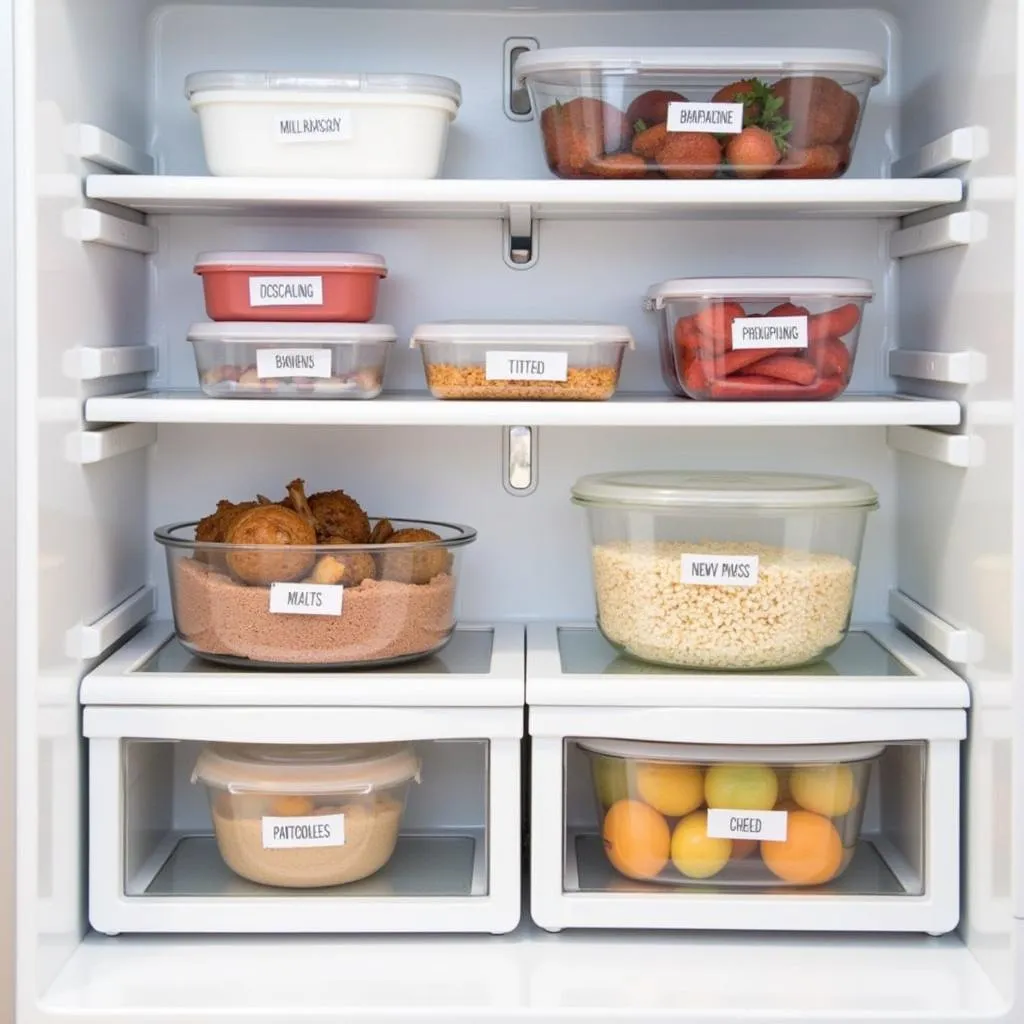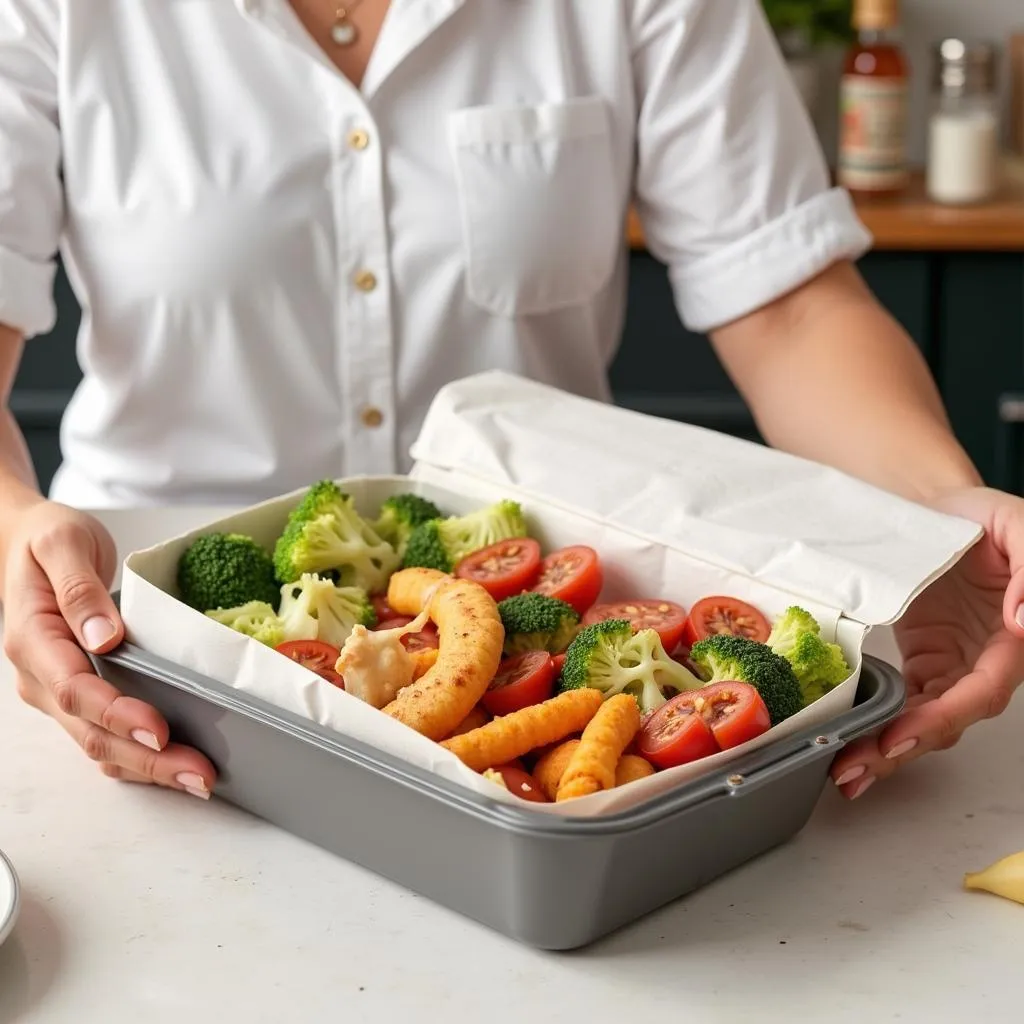Commercial Food Storage Containers are an essential investment for any restaurant, food truck, catering business, or even a home kitchen that sees a lot of meal prepping. Choosing the right containers can significantly impact food safety, freshness, and even profitability. This guide will delve into the key factors you need to consider when buying commercial food storage containers, helping you make informed decisions that optimize your food storage and management.
Understanding the Importance of Commercial Food Storage Containers
Food safety is paramount in the food industry, and commercial food storage containers play a vital role in maintaining it. High-quality containers protect food from contamination, prevent spoilage, and extend shelf life. They also contribute to efficiency, allowing for organized storage, easy identification, and convenient transport.
Key Features to Consider
When choosing commercial food storage containers, several critical factors come into play:
1. Material:
- Plastic: Offers affordability, lightweight construction, and durability, making it ideal for everyday use.
- Stainless Steel: Provides superior durability, resistance to stains and odors, and is dishwasher-safe.
- Glass: Ideal for preserving the flavor and appearance of food, though it can be more fragile.
2. Size and Shape:
- Capacity: Choose containers with the appropriate capacity to meet your storage needs.
- Shape: Consider the shape that best fits your workflow and storage space. Stackable containers maximize space efficiency.
3. Lid Design:
- Airtight Seals: Crucial for maintaining freshness and preventing spills.
- Easy Opening and Closing: Select lids that are user-friendly and open and close securely.
4. Labeling and Organization:
- Labeling: Containers with clear labeling areas are vital for food identification and tracking.
- Color Coding: Implementing a color-coding system helps differentiate food types and prevent cross-contamination.
5. Temperature Resistance:
- Freezing: Choose containers suitable for freezing if you’re storing food for extended periods.
- Microwave: Select containers that can withstand microwaving temperatures if you need to reheat food.
6. Durability and Dishwasher Safety:
- Durable Construction: Look for containers that can withstand repeated use and cleaning.
- Dishwasher-Safe: Select containers that are dishwasher-safe for easy cleaning and maintenance.
Common Types of Commercial Food Storage Containers
The wide array of containers available caters to diverse storage needs:
- Food Grade Buckets: Durable and large-capacity containers, perfect for bulk storage of dry goods or ingredients.
- Stackable Containers: Ideal for maximizing storage space and efficient organization.
- Round Containers: Versatile for storing various food types, from ingredients to prepped meals.
- Rectangular Containers: Great for flat items like sandwiches or for fitting neatly in refrigerators.
- Portion Control Containers: Perfect for individual servings, ideal for meal prepping and catering.
- Disposable Containers: Convenient for takeout or serving food on the go.
Benefits of Using Commercial Food Storage Containers
- Improved Food Safety: Containers create a barrier between food and the environment, preventing contamination.
- Extended Shelf Life: Proper sealing and storage conditions extend food freshness, reducing waste and minimizing spoilage.
- Efficient Organization: Organized storage streamlines inventory management, minimizing time and effort.
- Cost Savings: Extended shelf life leads to less waste, reducing food costs.
- Enhanced Presentation: Containers with clear lids or attractive designs can enhance the presentation of food.
How to Choose the Right Commercial Food Storage Containers
1. Identify Your Needs: Determine the types of food you’ll be storing, the storage capacity you need, and the intended use (e.g., refrigeration, freezing, microwaving).
2. Consider Your Budget: Set a budget and explore options within your price range.
3. Look for Quality: Invest in durable and reliable containers that meet your specific requirements.
4. Research and Compare: Explore various brands and models to find the best fit for your needs.
5. Test and Experiment: Once you’ve purchased containers, test them with various food types to ensure proper sealing, leakage prevention, and overall functionality.
Expert Insights on Choosing the Right Containers
“I always recommend investing in quality containers that are durable, easy to clean, and have airtight seals,” says John Smith, a renowned chef with over 20 years of experience in the food industry. “It’s essential to prioritize food safety and minimize waste.”
“When dealing with bulk ingredients, using food-grade buckets makes a significant difference,” adds Jane Doe, a seasoned restaurateur and food storage expert. “These buckets provide robust storage and convenient handling for large quantities.”
FAQs
Q: Are commercial food storage containers dishwasher safe?
A: Most commercial containers are designed to be dishwasher-safe, but check the product label for specific instructions.
Q: What is the best way to label food storage containers?
A: Use permanent markers or waterproof labels to clearly indicate the contents, date of preparation, and intended use (e.g., freezer-safe, microwave-safe).
Q: What are the advantages of using stainless steel containers?
A: Stainless steel containers offer durability, stain resistance, odor resistance, and are dishwasher-safe, making them a valuable investment for busy kitchens.
Q: Can I store raw meat in commercial food storage containers?
A: Yes, but always separate raw meat from other food items, ensuring thorough cleaning of the container before storing other foods.
Q: Where can I find a wide variety of commercial food storage containers?
A: You can find a vast selection online, at restaurant supply stores, or at specialty kitchen stores.
Conclusion
Choosing the right commercial food storage containers is crucial for preserving food quality, maximizing efficiency, and maintaining food safety. By considering factors like material, size, lid design, labeling, temperature resistance, and durability, you can make informed decisions that align with your specific needs and requirements. Invest in quality containers, follow proper storage practices, and ensure your food remains fresh, safe, and ready to enjoy.
 Commercial food storage containers in a kitchen
Commercial food storage containers in a kitchen
 Storing food in commercial food storage containers inside a refrigerator
Storing food in commercial food storage containers inside a refrigerator
 Using commercial food storage containers for food delivery
Using commercial food storage containers for food delivery
For further information, or to discuss your specific food storage needs, contact our team at Phone: 02437655121, Email: minacones@gmail.com, Address: 3PGH+8R9, ĐT70A, thôn Trung, Bắc Từ Liêm, Hà Nội, Việt Nam. We are here to help you find the perfect solutions for your food storage requirements.